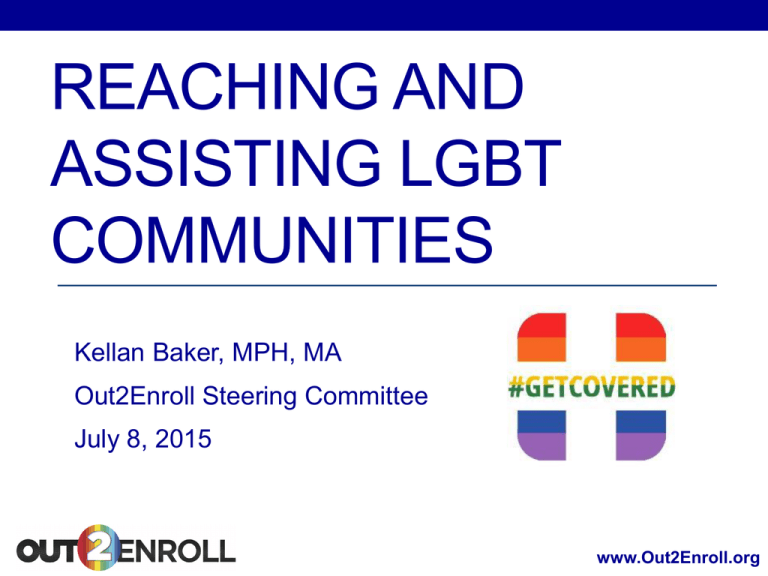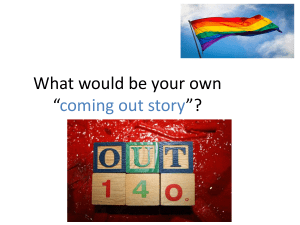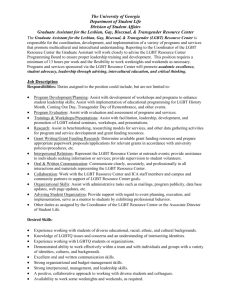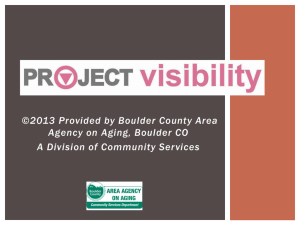
REACHING AND
ASSISTING LGBT
COMMUNITIES
Kellan Baker, MPH, MA
Out2Enroll Steering Committee
July 8, 2015
www.Out2Enroll.org
Our mission: To connect LGBT people with their
new coverage options under the ACA.
“Be out. Be healthy. Get covered.”
Federal
Agencies
Project
www.Out2Enroll.org
Session Goals
1. Define terms, identities, and concepts associated with
LGBT communities.
2. Describe systematic health care access barriers that
LGBT populations have historically faced, and how the
Affordable Care Act can help address them.
3. Identify best practices and practical tips for addressing
LGBT-specific enrollment questions.
4. Develop skills for enrolling LGBT individuals and
families effectively.
www.Out2Enroll.org
What is LGBTQ?
• LGBT: Lesbian, Gay, Bisexual, Transgender
• Queer: A reclaimed word some LGBT people use to
describe their identity as lesbian, gay, bisexual, and/or
transgender.
• Sexual orientation: Not just about sexuality or who you
are attracted to—also about who you love and who you
create a family with.
- Heterosexual or straight
- Gay or lesbian
- Bisexual
www.Out2Enroll.org
Transgender Terminology
•
Gender identity: Each person’s deeply felt,
internal knowledge of their own gender.
•
Transgender: A person whose gender
identity is different from that typically
associated with their assigned sex at birth.
•
Trans man: A person who was assigned the
female sex at birth but identifies and lives as
a man.
•
Trans woman: A person who was assigned
the male sex at birth but identifies and lives
as a woman.
www.Out2Enroll.org
Which of the following is not a term
describing sexual orientation?
A. Straight
B. Transgender
C. Heterosexual
D. Lesbian
www.Out2Enroll.org
How many people in the United States
identify as LGBT?
A. 700,000
B. 1.3 million
C. 9 million
D. 35 million
www.Out2Enroll.org
Where Do LGBT People Live?
Source: www.lgbtmap.org/equality-maps/lgbt_populations
www.Out2Enroll.org
www.Out2Enroll.org
What comes to mind when
you think about LGBT
health?
www.Out2Enroll.org
Health Disparities
↑ Tobacco and other substance use
↑ Mental health concerns, such as
depression and suicide attempts
↑ Certain cancers, such as breast cancer
↑ Experiences of bullying and violence
↑ HIV/AIDS
Source: The Health of Lesbian, Gay, Bisexual and Transgender People (Institute of Medicine, 2011),
Healthy People 2020
www.Out2Enroll.org
Anti-LGBT
bias and
discrimination
Poverty
Lack of
insurance
coverage
Lack of legal
recognition
Homelessness
Racism and
other
structural
discrimination
LGBT Health
Disparities
Lack of LGBT
cultural
competence
Source: The Health of Lesbian, Gay, Bisexual and Transgender People (Institute of Medicine, 2011),
Healthy People 2020
www.Out2Enroll.org
Discrimination
Treated unfairly by employer
21%
Received poor service because of
being LGB/T
23%
Made to feel unwelcome at a place of
worship
29%
Threatened or physically attacked
30%
Rejected by family or friends
Subjected to slurs or jokes
39%
58%
Source: Pew Research Center, June 2013
www.Out2Enroll.org
Poverty
70%
60%
50%
40%
30%
20%
10%
0%
<$16,000
$16,000-$23,000
$23,000-$34,000
$34,000-$45,000
Annual Income (among LGBT people with incomes <400% FPL)
Source: Center for American Progress
www.Out2Enroll.org
Are LGBT people more likely to be
uninsured than non-LGBT people?
A. Yes
B. No
www.Out2Enroll.org
Uninsurance Among LGBT People
30%
25%
24.20%
22.00%
23.70%
20%
17.20%
16.70%
15.00%
15%
17.60%
LGBT
13.20%
Non-LGBT
10%
5%
0%
Q3 2013
Q4 2013
Q1 2014
Q2 2014
Source: Gallup
www.Out2Enroll.org
Uninsurance Among Low- and
Middle-Income LGBT Adults
Source: Center for American Progress
www.Out2Enroll.org
Especially: Same-Sex Couples
• Same-sex couples often have difficulty accessing
coverage for themselves and their children.
• Reasons include:
-
Lack of legal relationship recognition
-
Lack of benefits such as employer-sponsored
insurance for domestic partners or same-sex spouses
-
Other employment discrimination
-
Lack of second-parent adoption rights
www.Out2Enroll.org
Source: Freedom to Marry
www.Out2Enroll.org
Especially: Transgender People
• Transgender people are frequently denied insurance
coverage and health care just because of who they are.
• Transgender exclusions remain in many plans.
• Types of care affected by exclusions:
- Preventive screenings (Pap tests, mammograms)
- Mental health counseling
- Hormone therapy
- Gender confirmation surgeries
- Any other kind of care a trans person might need
www.Out2Enroll.org
LGBT people want to get covered…
…But they need
your help.
www.Out2Enroll.org
How can you reach LGBT
consumers?
www.Out2Enroll.org
Partner with LGBT organizations and use relevant
images, language, and content.
www.Out2Enroll.org
Key Messages for LGBT People
• LGBT Nondiscrimination
• Financial Assistance
• Access to Family Coverage
• Better Quality Coverage
Source: Center for American Progress
www.Out2Enroll.org
LGBT Nondiscrimination
“I understand that under federal law,
discrimination is not permitted on the basis of
race, color, national origin, sex, age, sexual
orientation, gender identity, or disability.”
www.Out2Enroll.org
Financial Assistance
• If a same-sex couple is legally married in any state and
file federal taxes jointly, they can apply jointly for advance
premium tax credits, regardless of where they live.
• Couples who do not file jointly, including those in a domestic
partnership or civil union, need to apply for tax credits
individually.
• A child’s eligibility for financial assistance is tied to the parent
that claims the child on their federal taxes.
www.Out2Enroll.org
Access to Family Coverage
• Insurers that offer family or spousal coverage to different-
sex spouses must also cover legally married same-sex
spouses, regardless of what state they live in.
• Florida’s Medicaid program must now consider legally
same-sex married couples a family when determining
eligibility.
www.Out2Enroll.org
Better Quality Coverage
• Important new protections for LGBT people with HIV,
cancer, or other health conditions:
Plans can no longer deny coverage because of pre-
existing conditions.
Plans cannot set annual or lifetime limits on coverage.
• Essential health benefits help address LGBT disparities:
Preventive screenings
Mental health and substance use treatment
Prescription drug coverage
Reproductive health care
www.Out2Enroll.org
Now that you’ve reached out…
What’s next?
www.Out2Enroll.org
Create a Welcoming Environment
Display nondiscrimination policies.
Include a general
nondiscrimination statement
during the opening conversation.
Post “safe space” or rainbow
stickers and posters.
Have LGBT reading materials
available in waiting areas.
Provide unisex bathrooms.
www.Out2Enroll.org
Provide the Right Help
Don’t assume anything about people, such as
• Gender and gender identity
• Appropriate name and gender pronoun
• Sexual orientation
• Relationship status and family configuration
• HIV/AIDS status
When in doubt, politely ask rather than guessing.
“How would you like me to refer to you?” “What pronoun
is appropriate?” “How would you like to be addressed?”
www.Out2Enroll.org
Be Aware of Language
In addition to he/him/sir and she/her/ma’am, some
transgender people may use pronouns such as they/them.
Write down and consistently use the appropriate name
and gender pronoun, especially if it’s different from the
person’s legal record.
Use gender-neutral language for families, such as
“partner,” “spouse,” and “parent.”
“Some of that language stuff is really important, you know? I’d either shut down
or I’d get angry. I’d be like, you called me ma’am; are you kidding me?”
– Transgender man
www.Out2Enroll.org
Build Trust with LGBT Clients
Give applicants the option to point or
write down answers themselves.
Keep the focus on services rather than
indulging in questions out of curiosity.
Never disclose a person’s LGBT status
to anyone who does not need the
information to provide services.
Simply apologize and move on in case
of a mistake.
www.Out2Enroll.org
Application Assistance
• Name and gender – on the form (though not in conversation)
rely on what’s on the majority of the applicant’s ID documents
• Relationship status – legal relationship recognition?
• Household configuration – filing joint federal income taxes?
• Plan exclusions – transgender exclusions?
• Plan formularies – HIV and other medications?
• Provider networks – providers listed on www.glma.org or
known as a Ryan White Provider?
www.Out2Enroll.org
Case Studies
www.Out2Enroll.org
Case Study #1: Maria
Maria contacts you to learn more about enrolling in health
insurance coverage. In addition to getting insurance for
herself, Maria would also like to get coverage for her wife
Jenny and their daughter Sarah.
www.Out2Enroll.org
What is the most important determinant of
whether Maria and Jenny can get family
coverage?
A. Whether they have children together
B. Where they were married
C. How they file federal taxes
D. What state they live in
www.Out2Enroll.org
Case Study #2: Jimmy
Jimmy contacts you to learn more about enrolling in health
insurance coverage. He says that he needs a plan that
includes providers who have expertise in the treatment of
HIV.
www.Out2Enroll.org
What are some strategies to help
Jimmy find the right plan?
www.Out2Enroll.org
Case Study #3: Sam
Sam contacts you by phone to learn more about enrolling
in health insurance coverage. When you address Sam as
“sir,” Sam corrects you by saying, “Actually, it’s ma’am.”
www.Out2Enroll.org
What should you not do next?
A. Ask what gender Sam’s ID says and just use that
B. Make a note that Sam identifies as female
C. Consistently refer to Sam as “she” in the future
D. Apologize and move on
www.Out2Enroll.org
Some LGBT Resources
• Out2Enroll: www.Out2Enroll.org
• Key Lessons for LGBT Outreach and Enrollment Under the
Affordable Care Act (Out2Enroll, 2014):
http://out2enroll.org/wpcontent/uploads/2014/07/O2E_KeyLessons_FINAL.pdf
• Moving the Needle: The Impact of the Affordable Care Act
on LGBT Communities (Center for American Progress, 2014):
https://www.americanprogress.org/issues/lgbt/report/2014/11/1
7/101575/moving-the-needle/
• Where to Start, What to Ask: A Guide for LGBT People
Choosing Healthcare Plans (Strong Families Coalition, 2014):
http://strongfamiliesmovement.org/lgbt-health-care-guide
www.Out2Enroll.org
Follow us on social media!
Twitter: @Out2Enroll
Facebook: Out2Enroll
Tumblr: Out2Enroll
www.Out2Enroll.org
Thank you!
Kellan Baker
kellan@out2enroll.org
Katie Keith
katie@out2enroll.org
www.Out2Enroll.org





